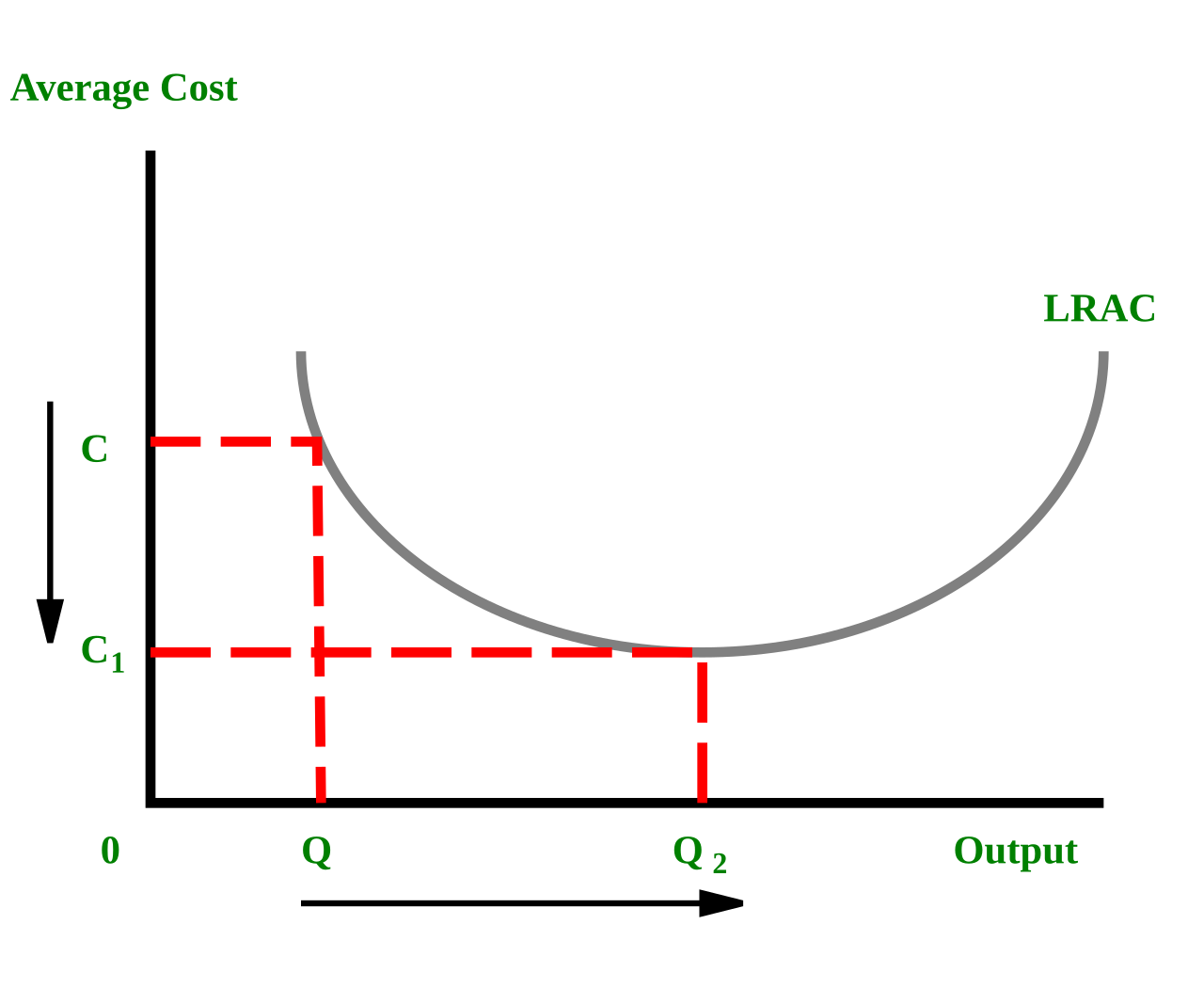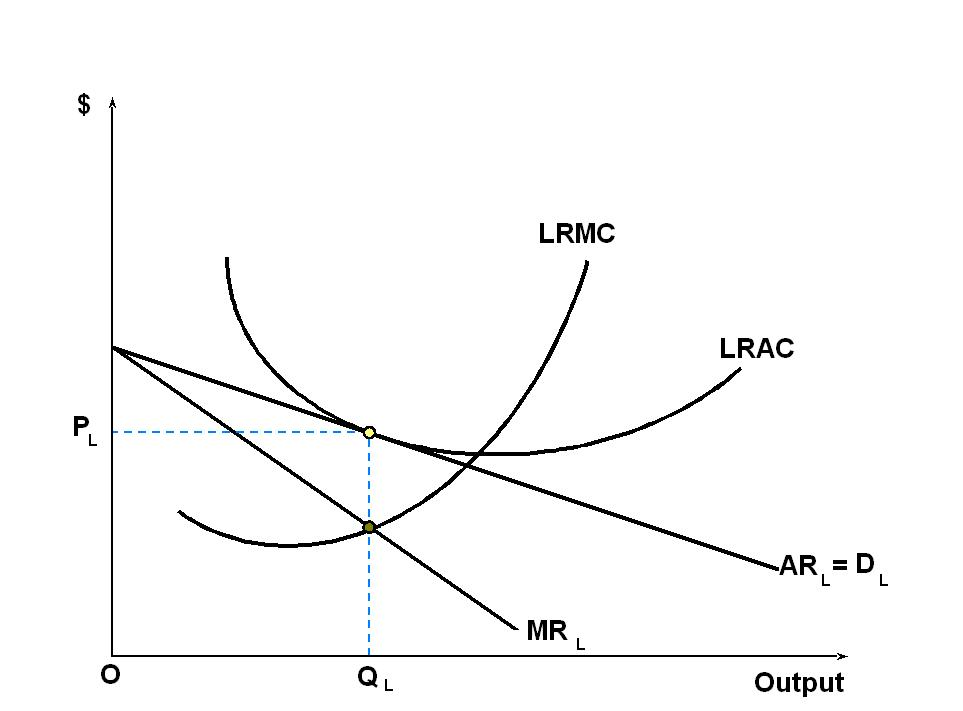AQA Specification focus:
‘Other economic benefits of trade, such as the ability to exploit economies of scale and increased competition.’
Introduction
International trade provides nations with significant economic advantages beyond increased output. Two central benefits are economies of scale and greater competition, both of which enhance efficiency, innovation, and global consumer welfare.
Economies of Scale
Definition and Concept
When firms expand production for international markets, they often experience economies of scale. This occurs when average costs fall as output increases, improving efficiency.

The diagram depicts the relationship between average cost and output level, showing the downward-sloping curve that characterises economies of scale. Note: This diagram focuses on internal economies of scale and does not detail external economies. Source
Economies of Scale: Reductions in average costs that arise from increasing the scale of production.
Firms accessing global markets can reach larger demand bases, enabling them to lower per-unit costs. This strengthens their competitiveness internationally.
Types of Economies of Scale
Internal economies of scale – cost advantages that occur within a single firm as it grows. Examples include:
Bulk purchasing of raw materials.
Specialisation of labour.
Use of advanced technology spread across larger output.
External economies of scale – cost advantages experienced by entire industries as they expand. Examples include:
Shared supplier networks lowering input costs.
Skilled labour pools forming in industry hubs.
Improved infrastructure supporting industry growth.
Implications for Trade
Lower prices for consumers: Reduced costs mean goods and services can be sold more cheaply.
Higher efficiency: Resources are allocated more productively.
Global competitiveness: Domestic firms can compete with large multinational corporations.
Increased Competition
Definition and Concept
Opening markets to international trade exposes domestic firms to greater competitive pressures, forcing them to operate more efficiently.
Competition: The rivalry between firms seeking to win consumers’ business by offering lower prices, better quality, or innovation.
This competition can be domestic firms versus imports, or between multinational corporations operating in the same markets.
Key Benefits of Competition from Trade
Improved efficiency: Firms must minimise waste and reduce costs to remain competitive.
Innovation: To differentiate themselves, businesses invest in research, new products, and better processes.
Consumer choice: Trade expands the range of goods and services available to households.
Price discipline: Foreign competition prevents domestic firms from charging excessively high prices.
Exposure to international markets forces domestic firms to operate more efficiently.

The graph shows the long-run equilibrium position of a firm under monopolistic competition, where the price equals average cost, resulting in normal profit. Note: This diagram includes information on monopolistic competition, which may extend beyond the immediate scope of the syllabus. Source
Interaction Between Scale and Competition
Reinforcing Benefits
Economies of scale enhance firms’ ability to lower costs, strengthening their position in competitive markets.
Competition incentivises firms to continue exploiting scale benefits to stay ahead.
The two effects together create a cycle where efficiency and innovation feed into each other, delivering dynamic long-term advantages.
Dynamic vs Static Gains from Trade
Static Gains
Static gains occur immediately after trade liberalisation:
Lower costs through economies of scale.
Increased consumer choice from competitive imports.
Dynamic Gains
Dynamic gains build over time as industries adjust:
Productivity growth through innovation and investment.
Economic development driven by exposure to global competition.
These dynamic benefits are especially important for long-run economic growth.
Limitations and Considerations
Possible Downsides of Scale
Over-concentration: Large firms benefiting from scale may dominate markets, creating monopolies.
Vulnerability to shocks: Specialisation at scale in a narrow set of industries may expose economies to global downturns.
Possible Downsides of Competition
Short-term job losses: Domestic firms unable to compete with imports may shut down.
Pressure on wages: Increased competition can drive firms to cut labour costs.
While economies of scale and competition generate overall benefits, governments may need to implement policies to reduce adjustment costs for vulnerable industries.
Link to UK Trade
For the UK, scale and competition are central in understanding trade benefits:
The UK’s financial services sector benefits from scale by serving global clients, reducing costs per transaction.
Exposure to European and global markets forces UK manufacturers to innovate and remain competitive.
Consumers benefit from cheaper imported goods, stimulating welfare gains.
Summary of Key Points
Trade enables firms to exploit economies of scale, lowering average costs.
Competition from international markets drives efficiency, innovation, and consumer benefits.
The interaction of scale and competition generates both static and dynamic gains, vital for long-run economic performance.
Some downsides exist, but overall, these benefits are essential in explaining why nations pursue free trade policies.
FAQ
Smaller firms often struggle to access the same cost savings as larger firms because they lack the production volumes required for bulk purchasing or advanced technology use.
Larger firms can spread fixed costs, such as research and development, across higher output levels. Smaller firms, meanwhile, may face competitive pressures that limit growth unless they specialise in niche markets.
Internal economies of scale occur within a single firm as it expands output, such as through bulk buying or worker specialisation.
External economies of scale benefit an entire industry, for example when:
Specialist suppliers develop within a region.
Skilled labour pools emerge.
Infrastructure improves around industrial hubs.
When domestic firms face foreign competitors, they must find ways to attract and retain customers.
Innovation may take the form of:
New product development.
Improved production processes.
Adoption of new technologies.
Such changes can help firms maintain market share and adapt to global demand shifts.
Static gains occur immediately from trade, such as lower costs through economies of scale and cheaper imports for consumers.
Dynamic gains occur over time, including productivity growth, investment, and innovation driven by competitive markets. These are essential for sustaining long-term economic growth.
Yes. If a firm grows large enough to dominate global markets, it may exploit its cost advantages to eliminate rivals.
This can result in:
Reduced consumer choice.
Potential price-setting power.
Barriers to entry for smaller competitors.
Governments may intervene with competition policy to prevent monopolistic behaviour.
Practice Questions
Define the term economies of scale. (2 marks)
1 mark for identifying the concept: reduction in average costs as output increases.
1 mark for reference to larger scale of production or increased output.
Explain how international trade can increase competition in domestic markets and assess one benefit this creates for consumers. (6 marks)
1–2 marks: Basic explanation that trade exposes domestic firms to competition from foreign producers.
1–2 marks: Clear development that this pressure forces firms to improve efficiency, reduce prices, or innovate.
1–2 marks: Assessment of at least one consumer benefit, e.g. lower prices, greater choice, higher quality.
Award full marks for answers that provide both clear explanation and a developed benefit for consumers.

